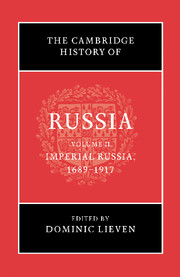Book contents
- Frontmatter
- Introduction
- Part I Empire
- Part II Culture, Ideas, Identities
- Part III Non-Russian Nationalities
- Part IV Russian Society, Law and Economy
- 11 The elites
- 12 The groups between: raznochintsy, intelligentsia, professionals
- 13 Nizhnii Novgorod in the nineteenth century: portrait of a city
- 14 Russian Orthodoxy: Church, people and politics in Imperial Russia
- 15 Women, the family and public life
- 16 Gender and the legal order in Imperial Russia
- 17 Law, the judicial system and the legal profession
- 18 Peasants and agriculture
- 19 The Russian economy and banking system
- Part V Government
- Part VI Foreign Policy and the Armed Forces
- Part VII Reform, War and Revolution
- Bibliography
- Index
- Map 5. The Russian Empire (1913). From Archie Brown, Michael Kaser, and G. S. Smith (eds.) Cambridge Encyclopedia of Russia 1982.">
- Plate Section">
- References
17 - Law, the judicial system and the legal profession
from Part IV - Russian Society, Law and Economy
Published online by Cambridge University Press: 28 March 2008
- Frontmatter
- Introduction
- Part I Empire
- Part II Culture, Ideas, Identities
- Part III Non-Russian Nationalities
- Part IV Russian Society, Law and Economy
- 11 The elites
- 12 The groups between: raznochintsy, intelligentsia, professionals
- 13 Nizhnii Novgorod in the nineteenth century: portrait of a city
- 14 Russian Orthodoxy: Church, people and politics in Imperial Russia
- 15 Women, the family and public life
- 16 Gender and the legal order in Imperial Russia
- 17 Law, the judicial system and the legal profession
- 18 Peasants and agriculture
- 19 The Russian economy and banking system
- Part V Government
- Part VI Foreign Policy and the Armed Forces
- Part VII Reform, War and Revolution
- Bibliography
- Index
- Map 5. The Russian Empire (1913). From Archie Brown, Michael Kaser, and G. S. Smith (eds.) Cambridge Encyclopedia of Russia 1982.">
- Plate Section">
- References
Summary
Reform
The 1864 judicial reform created Russia’s first constitution. When Alexander II signed the decree for the introduction of the judicial reform in November 1864, he delivered the death-blow to the autocracy. Although the tsar did not immediately recognise these consequences, educated public opinion certainly entertained no doubts in this regard. The judicial reform limited the authority of the monarch, since it separated the judiciary from the legislative and executive institutions, and confirmed the principle of judicial independence and tenure as a matter of law. But the reform of course went even further. It broke with the estate-based system of justice, as it had been promulgated by Catharine II at the end of the eighteenth century and set forth the equality of all subjects before the law. At least de jure, Russia was transformed into a state under the rule of law on the European model. For nothing remained either of the secret and inquisitorial methods which had been practised by lay judges in the estate-based courts. The long-familiar practices of Western Europe now came to Russia as well. No one was any longer to be punished for an action which the Criminal Code did not identify as a crime (‘nullum crimen sine lege’), and in civil proceedings, the principle of ‘where there is no plaintiff, neither shall there be a judge’ thenceforth applied.
- Type
- Chapter
- Information
- The Cambridge History of Russia , pp. 344 - 368Publisher: Cambridge University PressPrint publication year: 2006
References
- 4
- Cited by

